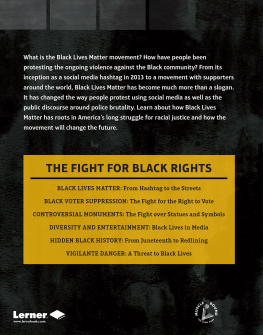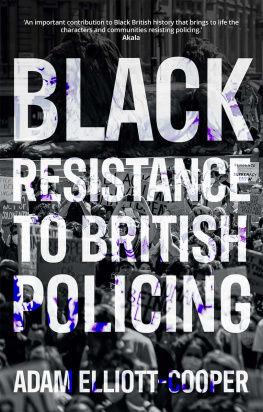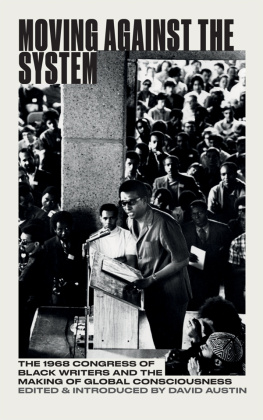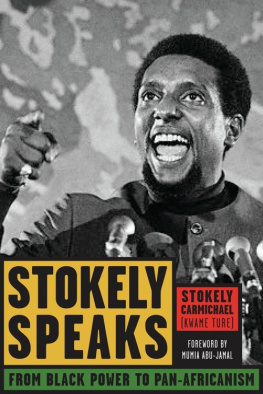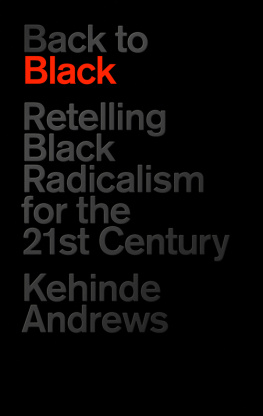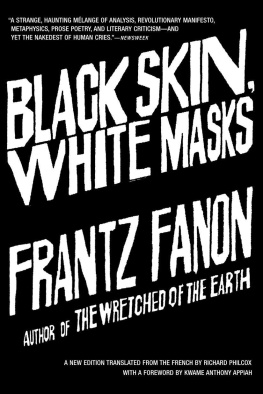For Jeremiah A. Wright
Fearless prophet, fiery preacher, unapologetically black scholar, unashamedly Christian witness for justice, and above all, beloved older brother and friend.
What shoulders to stand on!
With great admiration and deep gratitude.
At a time such as this, it is not light that is needed, but fire; it is not the gentle shower, but thunder. We need the storm, the whirlwind, and the earthquake.
Frederick Douglass, July , 1852
The whites... have occupied the country forcibly and appropriated it to themselves. That, of course, does not prove their right to it. A large number even from among them believe that they will have to fight again to defend their occupation. But we shall say no more about this. One will reap as one sows.
Mahatma Ghandi, October , 1910
There is a fire no water can put out.
Martin Luther King Jr., April , 1968
At some stage one can foresee a situation where black people will feel they have nothing to live for and will shout to their God: Thy will be done!... If the white God had been doing the talking all along, at some stage the Black God will have to raise His voice and make Himself heard...
Steve Biko, September 1970
Acknowledgments
Although somewhat longer in the making, this book was completed while South Africa was in complete lockdown due to COVID-. I have, of course, experienced curfews, house arrest, and isolation in prison under apartheid, but we have never known a complete lockdown of the whole country before. The coronavirus brought with it anxieties and fears we have not experienced since the influenza pandemic of 1918 , of which I had only heard stories of terrible devastation among our communities from my mother. So this experience came with unforeseen challenges. My wife and I were mostly alone throughout this time, and I am inexpressibly grateful for the space she gave me to finish this project within the confines of isolation and amidst these strange, disconcerting, and demanding circumstances.
Some say writing is a lonesome business. In a sense I suppose that is true, though I must confess that for me, a large part of the joy of writing is the constant conversation in ones head and heart with others as one wrestles with their work and the challenges and stimulation their thoughts represent, earnestly hoping that none of them are misrepresented in my own work. Seclusion works best for that, in my experience. But that sometimes calls for extraordinary sacrifices from others close to the one who is doing the writing, and only love can make those. So once again, thank you, Elna.
I have been writing for some years now, and I find myself constantly in conversation with myself in my earlier works. Reading and re-reading, re-valuating and engaging in self-critical reflection, I am amazed at what I have learned from others over the years, and I am deeply appreciative of what I have been able to unlearn, always hoping that this process contributes to a better product. That said, the pestilence that brought the lockdown is a terrifying thing, and I am filled with gratitude to God that I could find such comfort in writing during so extraordinary a time.
Something I have said before, but which now has taken on added significance, is my discussions with my children as they grow older and have more interest in what their father is writing. Sarah is close by, and I could bounce ideas off her on a regular basis with sometimes surprising results. Andrea is all the way across the ocean, now a senior at the University of San Francisco, and she has taken a class in liberation theology, which, she confessed, she has found fascinating. The profit for me has been prolonged Skype sessions of extraordinarily stimulating conversation. It is such a joy and encouragement when ones children show genuine interest in ones work, and can direct you to articles and books they were reading, and share the sometimes surprisingly relevant conversations with friends on social media. Thank you.
Something else I have never experienced to this extent before: in lieu of libraries all being closed by the lockdown throughout this process of writing, and with my own books not always in reach, it was a blessing to be able to do some research online and to find much that stimulated new thinking. So I owe a huge debt of gratitude to all those unseen colleagues, in academia and other spheres so crucial to my thinking and development, who have posted articles of such high academic and journalistic standards online. I thank those colleagues who were willing to take some time reading and commenting on some of these chapters. They have been immensely helpful, but my friend and esteemed colleague, Professor Tinyiko Maluleke, deserves a special word of thanks for his critical and encouraging engagement. Some of the matters discussed in this work are topics of great contention, and I hope they can sense where their help has kept me from going completely off the rails. Without access to all this, I honestly do not know what I would have done to finish this work.
Portions of some of these chapters have been published elsewhere over the past year or so. Chapter first appeared as a tribute in memory of James Cone in a special edition of Journal of Theology for South Africa (March 2019) . Originally, chapter was a contribution to Contesting Post-racialism: Conflicted Churches in the United States and South Africa , published by the University Press of Mississippi ( 2015 ). Earlier forms of chapters , , and appeared in Hervormde Theological Studies . ( 2019 ), Hervormde Theological Studies . ( 2020 ), and in Black Theology: An International Journal . ( 2020 ), respectively. My sincere gratitude to all for their permission to use them here. Some, or sections of them, have been presented as papers at conferences and on invitation in classes before the coronavirus forced us into isolation, and I am grateful for the opportunity for face-to-face conversationnow no longer to be taken for grantedthat helped to shape their final form. Needless to say, all of them have of course been expanded and substantially reworked for this publication.
I was a preacher before I was a writer, and I still am. That means that besides an extra dose of discipline, one needs the sobering and steady guiding hand of a good editor. At Cascade, I have had that in abundance, and I am deeply grateful to my publisher and their dedicated team of colleagues with whom I have enjoyed such a fruitful relationship for the last few years. I am deeply grateful to Blake Adams, my copyeditor, who has been extraordinarily helpful and admirably patient in his work with me. Special thanks is also due to my editor on this one, Dr. Charlie Collier, a kindred spirit in the global struggle for freedom. It was a special privilege having minds of such great wisdom, patience, and sensitivity guiding me in this effort. In important ways, they have helped to make this book a better one.
Preface
Where Do We Go from Here?
Every truth, it seems, has its time, wrote influential and respected South African intellectual Njabulo Ndebele in his Foreword to the fortieth edition of Steve Bikos enduring classic, I Write What I Like. Before that time arrives, the truth may be seen, perhaps even intuited, but never really grasped. That is true, not only for the one truth that Ndebele (re)discovered and meditates on, as we shall see, but for the many truths Biko had tried to teach us. They are being discovered anew for this generation, and Biko has remained alive because of the inescapable, prophetic truthfulness not just of his words, but of his life and death.
The rediscovery of Biko and the movement he was father to, Black Consciousness is, it seems, a sweeping phenomenon. The relevance of the man and his work is so clear, so powerful, so disrupting, that it cannot be ignored; not by politics and not by academia. This is so because Biko and Black Consciousness have continued to captivate the minds of generation after generation, and so has, for the last decade or so, its inseparable twin, Black liberation theology. This reemerged phenomenon has stubbornly insisted on calling our attention to what the struggle for liberation really was fought for, and in doing that, simultaneously calling us all to account.


